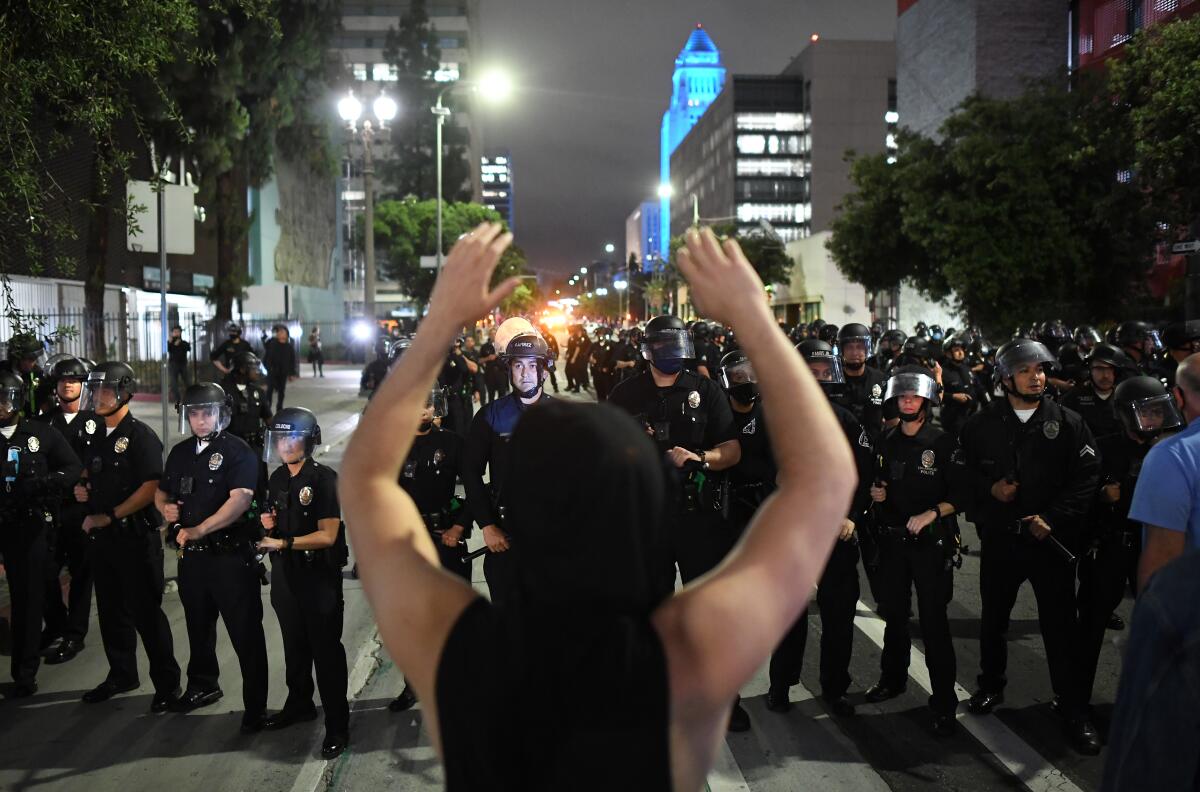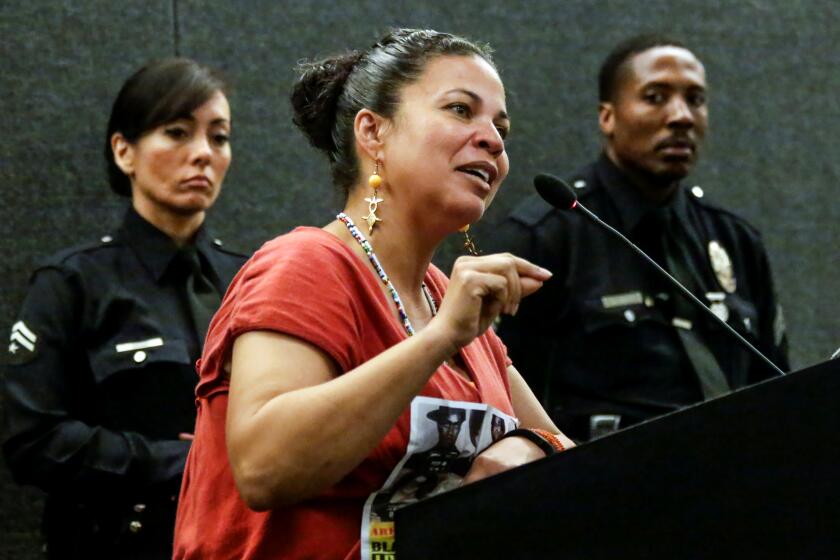L.A. officials get report on LAPD mishandling of protests. Now what?

- Share via
Roughly a week after the release of a new report that faulted the Los Angeles Police Department for mishandling protests following the death of George Floyd, Los Angeles officials began to mull what should come next.
“Do we actually have to create a new bureau?” asked Councilman Kevin de León, referencing a core recommendation in the report that has drawn concern from activists critical of the department.
The report, sought by council members in the aftermath of the summer protests, was prepared by a team of former LAPD commanders headed by attorney Gerald Chaleff. It found a host of failures in how the LAPD had handled the unrest, including poor planning, scant training on weapons wielded against protesters, and a broader “chaos of command.”
Council members have said they were especially troubled that the LAPD was repeating problems that had already led to lawsuits and costly settlements in the past, with the department failing to follow rules that had already been imposed.
Leaders of Black Lives Matter-Los Angeles are denouncing a recommendation headed before the City Council this week that the Los Angeles Police Department increase its online intelligence-gathering capabilities ahead of future protests, alleging its members are already overly-scrutinized and harassed by police.
At a Wednesday meeting of a City Council committee that focused on the recently released report, Councilwoman Monica Rodriguez called the handling of the unrest “one of the worst examples in the history of the department.”
“I think we should all be outraged by it,” Rodriguez said. “Our city has the responsibility of being better prepared to meet these moments.”
Council members did not push forward with any recommendations, but asked for the LAPD to come back to the committee with reports on a host of issues including training, policies about the use of “less lethal” weapons, and rules imposed under past settlements over mass protests.
The LAPD is already being sued over its handling of the 2020 protests, including by Black Lives Matter-Los Angeles and other groups that allege that police brutalized protesters with hard foam bullets and batons and trampled on their rights.
Although the report reiterated some of the same concerns raised by activists, several of its recommendations have alarmed BLM-LA and other groups that argued the changes would lead to increased surveillance and suppression of demonstrations.
For instance, Chaleff and his team recommended that the city create a new bureau focused on “public order policing” and buy software to analyze and glean intelligence from online postings. BLM-LA, the Stop LAPD Spying Coalition and other groups called that “an extremely dangerous proposal” that would inevitably be used to repress department critics.
Doing so, they argued in a letter to the committee, would repeat a historical pattern in which “LAPD insiders recommend expanding police resources rather than listening to community demands.” Protesters this summer demanded the department be defunded, they said, not bolstered with more resources.
“Using George Floyd’s murder to increase policing presence and budgets is insulting to the intelligence of your constituents,” said Audrey Georg, an organizer with White People 4 Black Lives.
Aides to Sheriff Alex Villanueva looked to a former deputy for permission to set up a helipad near Villanueva’s house on property owned by SoCal Gas.
Backers of the Police Department, in turn, called into the meeting to argue that officers had been violently attacked by destructive crowds and needed more resources, training and officers to respond. One denounced the protesters as “radical left-wing Marxist terrorists”; another said destruction during the unrest wasn’t “just a couple of bad apples.”
“We need consequences for people who break the law,” the man said.
Chaleff disputed the idea that the report had recommended a significant increase in funding for the department, calling it “minimal at most,” or that it would ramp up surveillance. The purpose of a dedicated bureau “is to make sure that the people who want to protest have the opportunity to protest,” he said at the Wednesday meeting.
In response to de León asking if a new bureau was necessary, he said that doing so would help show that the issue should be taken seriously in the department.
Councilman Marqueece Harris-Dawson flatly rejected the idea that this was “the police department’s report,” but he also told department defenders that “if you love the police department and you love police officers, you need their work to be examined and you need their work to be critiqued so it can get better.”
In addition to creating a new bureau, the report recommends updating training, conducting regular audits of whether the LAPD is adhering to settlement agreements, and clamping down on which officers can use 40-millimeter hard foam projectiles, among other changes to department practices.
L.A. officials are still awaiting two other reports on the handling of the protests, one produced by the LAPD, another commissioned from the National Police Foundation by the L.A. Police Commission.
The LAPD has declined to comment on specific criticisms in the report before completing its own review. Mayor Eric Garcetti has said he will seek changes based on the findings and recommendations of all three reports.
More to Read
Sign up for Essential California
The most important California stories and recommendations in your inbox every morning.
You may occasionally receive promotional content from the Los Angeles Times.












